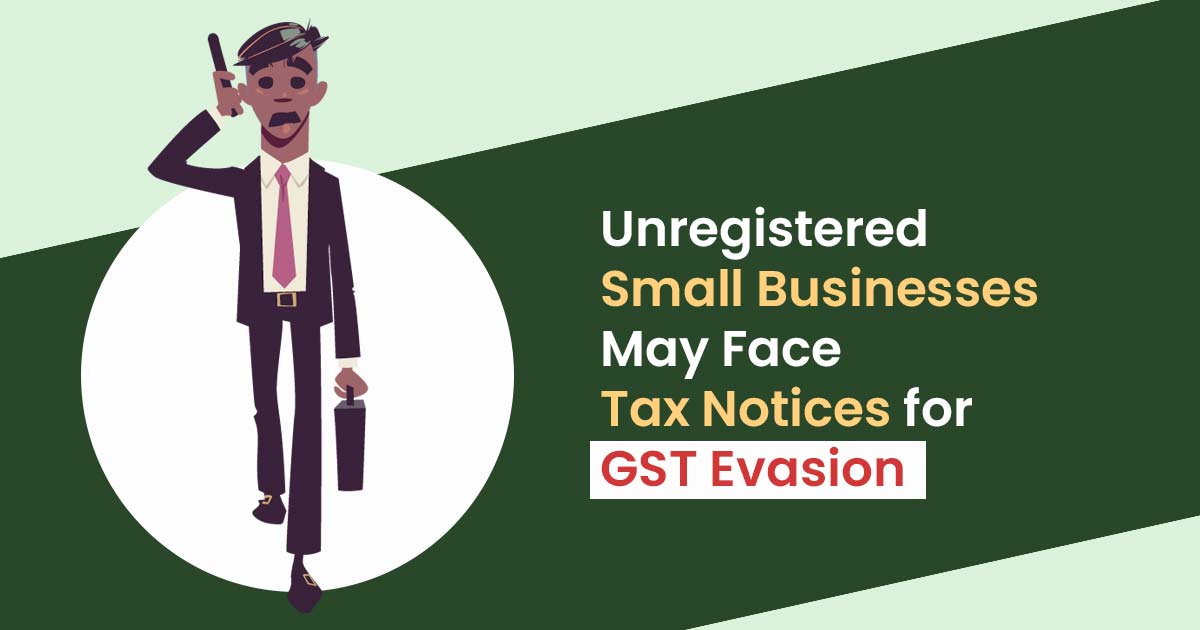
According to the report, the Gujarat State GST department has escalated its concentration on business-to-consumer (B2C) sectors, objecting to solving tax compliance issues. For potential tax evasion and non-compliance, industries like coaching classes, ice cream parlours, salons and mobile phone dealers are under the probe.
Tax evasions are exposed in the raids that emerged recently in Gujarat of Rs. 20 crore. It was discovered by the officials that many registered traders have provided ineffective reports of income, and a bigger number of unregistered businesses surpass the limit of the GST without complying.
From that, a question arises can unregistered small businesses get GST notices?
GST authorities under the Central Goods and Services Tax (CGST) Act, 2017, are provided the authority to scrutinize, audit, and compute businesses irrespective of their status of registration. GST law permits the authorities to provide notices to unregistered businesses whose turnover surpasses the limit. Sections 65 and 67 allow audits, inspections, and searches.
GST Registration Norms for Small Businesses
The limits of GST registration in India are made to balance tax compliance with the administrative ability of small businesses. Businesses as of April 1, 2019, who are in the supply of the goods are mandated to enroll for the GST if their annual turnover surpasses Rs 40 lakh and the service providers have a lower limit of Rs 20 lakh.
The motive of such limit is to facilitate the compliance load on small enterprises permitting them to function without any GST registration and filing issues. Once a business exceeds such turnover limits then the registration becomes obligatory to ensure tax compliance and effective accounting subject to the GST framework.
To balance tax compliance with the administrative capacities of small businesses, Goods and Services Tax (GST) registration thresholds in India are created. Businesses as of April 1, 2019, are in the supply of goods and are mandated to enrol for the GST if their annual turnover surpasses Rs 40 lakh, while service providers secure a lower limit of Rs 20 lakh.
What is the Concern of Unregistered Small Businesses?
To monitor unregistered dealers, including analyzing e-way bills, tracking transactions in personal accounts, and identifying income discrepancies the department uses various methods. Tax experts said that issuing notices before small businesses is valid statutorily, but enforcement may depend on socioeconomic and political factors.
For small businesses who do not have organized operations GST compliance could not be easy. Record-keeping, filing returns, and hiring professionals can be resource-intensive. Registered businesses get access to input tax credits, decreasing overall costs with time.
Small businesses can use the advantage of schemes like the composition scheme, which facilitates compliance processes.
As per the suggestion of the experts small businesses track their turnover, keep precise records, and enrol once the limits get exceeded. It is significant to have proactive compliance as the GST department can cross-reference bank transactions and additional data sources to catch non-compliance.
Read Also: Govt Consider AI and Data Analytics to Combat GST Evasion
With the expansion of the tax net awareness and compliance with GST norms are important for the small business. With effective norms, businesses are allowed to get an advantage from a structured tax framework while avoiding penalties and scrutiny.








